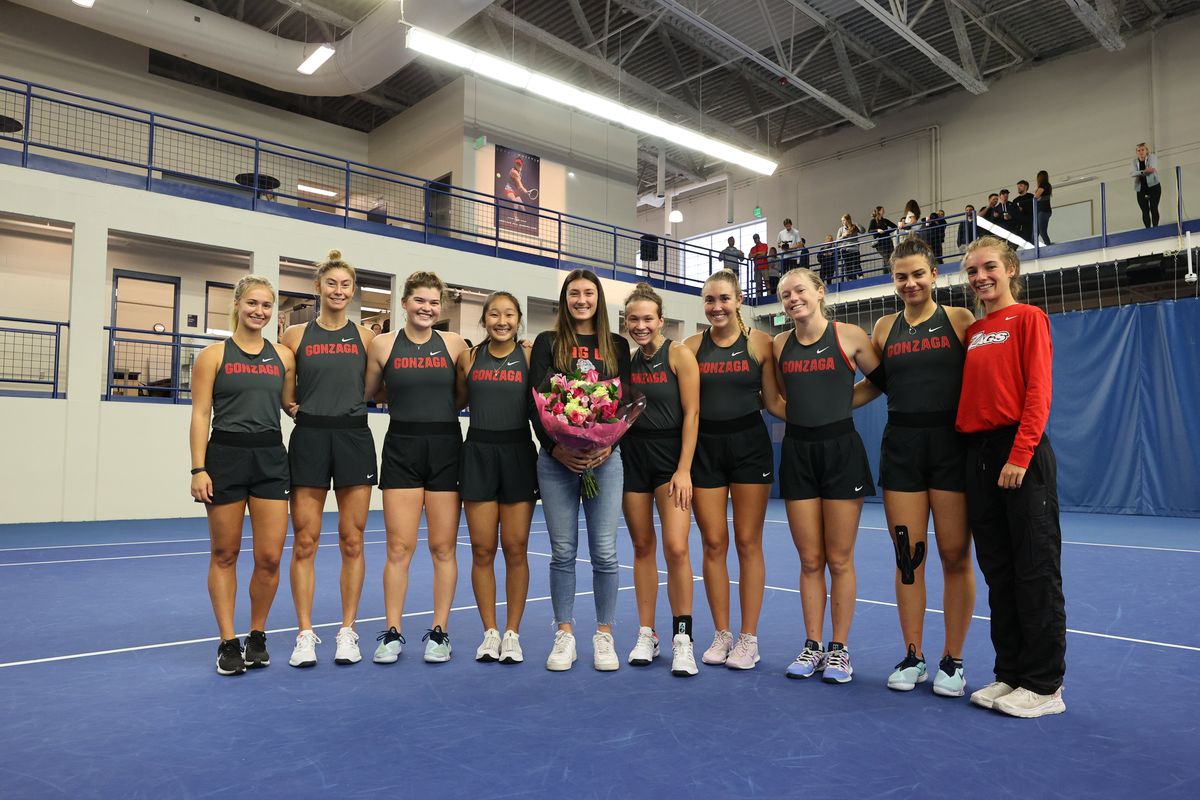As Gonzaga honors former standout Sophie Whittle, she and other women’s players reflect on impact of Serena Williams

The most decorated and winningest player in the history of Gonzaga tennis had a banner hung in her honor inside of the Stevens Center on Saturday before the second day of the Gonzaga Hidden Duel Tournament.
“It’s really special,” Whittle said. “I don’t really have any other words other than to say how special it is. It means a lot. It wouldn’t have been even possible without my coaches, former and my coaches at the time, and then also my teammates, whether I played with them for my freshman year or through my senior year, they all pushed me each day, in the best way.”
Whittle stood alongside her family and former coaches on the first court in the Stevens Center, looking up above at the south end of the center.
A curtain was draped over the banner before a reveal elicited cheers from the crowd.
The photo is of Whittle mid-backhand.
“Although it’s my photo, it should be one of our whole team just because they were a big part of everything,” she said.
Whittle knew of the ceremony a few months ago, but this was the first time she had seen the banner.
“It looks amazing and it’s really, really special,” she said.
Whittle was a singles All-American in 2019, the first time a Bulldog has won that award.
She won 90 singles matches, 46 of which came as the No. 1, and 59 doubles matches.
In her final season, she was ranked No. 1 in the nation and continued to hang inside of the top-15 during the spring.
Also in attendance was athletic director Chris Standiford – along with other members of the GU athletic department – the voice of the Bulldogs Tom Hudson and former Zag athletes.
“I just think it shows the Zag family that we have here in Spokane,” she said. “And it means a lot to me and for the program and the school to just be able to have this done. So, I appreciate it so much and for everyone taking the time to be here today. That moment will be something I’ll remember for a long time.”
Impact of Serena Williams
On September 2, Serena Williams lost in a three-hour match to Ajla Tomljanovic in the U.S. Open, playing in her 1,241st and final match.
The undisputed best women’s tennis player of all time, Williams spent 319 weeks as the top player in the sport.
Earlier this month Williams said the Open would be her final tournament.
“We knew that the day was going to come at some point, but we just didn’t know the timing,” Whittle said.
Every women’s tennis player who was born in the 1990s and 2000s grew up watching Williams and would wake up at any hour just to see her matches.
Whittle specifically remembers early mornings catching Williams’ Grand Slam wins.
When the former GU player went on tour, she would practice next to Williams which is a moment she never could have dreamt up as a kid.
“I know how much she has done for the game of tennis whether that’s for younger children or people that are aspiring to play in college or play after college,” she said.
Two of those women are freshmen Gracie Smyley and Scout Mathews.
An Eastern Eagle, Mathews said she watched all of the greats, including Andre Agassi, Pete Sampras, Roger Federer, but no one impressed her like Williams did.
“I just remember thinking, ‘wow, that girl is strong, she’s powerful,’” Mathews said. “I remember thinking she could hit the balls so hard, and I was really young but I was like, ‘wow, I hope one day I can get to that point.’”
Smyley – a Whitworth Pirate – agreed with the powerful sentiment, specifically her backhand that she also called clean.
She said Williams was a primary motivator for her, even though tennis was everywhere around her.
“Honestly, she’s probably one of the first people that really inspired me to take tennis seriously from a very young age even though it’s been around my whole life,” she said. I just saw how powerful and strong and brave she is.
That really just motivated me to take it to the next level and try my hardest to just be strong and amazing like her.”
And while her physical presence was daunting for her opponents, it was her mentality that drove her to greatness.
“She’s such a fighter,” Mathews said. “She is probably one of the biggest fighters I’ve ever seen. Her mentality is so strong, her mental toughness on court. She plays for survival.”
There were multiple examples over Williams’ career of where she had to overcome obstacles.
“When she had a bunch of injuries and bounced back and also balancing being a mother too – it’s just really inspiring,” Smyley said.
She won more Grand Slams than anyone else in history, but with a career as long as hers, she had plenty of losses. Smyley learned how to lose from Williams.
“Bouncing back is always important to just keep your head up to losses and everything,” she said. “You can just either win or you can grow from it.”
It is sad to see her hang up her racquet, Whittle said, but she is excited to see how her impact continues to grow on the court.
When Williams left the court earlier this month, she left under cheers with emotions crashing over the entire stadium.
“I felt for her,” Whittle said. “I mean, you can tell how much the game meant to her. And not necessarily like just the sport in general, but the people that supported her and the fans and just the environment that is created, that she’s created, and the support that she has behind her.”